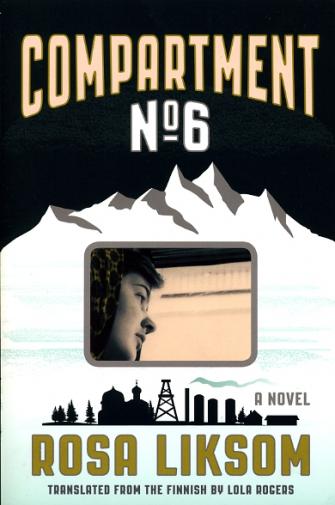Compartment No 6 2016, Graywolf Press, USA
Rosa Liksom
Compartment No 6 (original title: Hytti nro 6)
Translator: Lola Rogers
Publisher: Graywolf Press (2016)
In the waning years of the Soviet Union, a Finnish woman boards a train in Moscow, bound for Mongolia. Still smarting from a broken relationship, she chooses an empty compartment—No. 6.—but her solitude is soon shattered by the arrival of a fellow passenger: Vadim Nikolayevich Ivanov, a grizzled, opinionated, foul-mouthed former soldier. Vadim fills the compartment with his long and colorful stories, recounting in lurid detail his sexual conquests and violent fights. There is a hint of menace in the air, but initially the woman is more repulsed than scared. Though Vadim may be crude, he isn’t cruel, and he shares with her the sausage and black bread and tea he’s brought for the journey, coaxing her out of her silent gloom.
As their train cuts slowly across thousands of miles of a wintry Russia, where “everything is in motion, snow, water, air, trees, clouds, wind, cities, villages, people and thoughts,” a grudging kind of companionship grows between the two inhabitants of Compartment No. 6. When they finally arrive in Ulan Bator, a series of starlit and sinister encounters bring this incantatory story about a ruined but beautiful country to its powerful conclusion.
PRAISE FOR COMPARTMENT NO. 6
"The best books in 2016 were those that escaped the surround-sound cacophony of actuality and showed readers the magic and mysteries of elsewhere. Rosa Liksom’s “Compartment No. 6” describes the alliance that emerges between a young woman and a seedy construction worker stuck together on a train en route to Mongolia in the mid-1980s." —Wall Street Journal
"Liksom is a master of controlled exaggeration. With a couple of carefully chosen brushstrokes, a mini-story, she is able to conjure up an entire human destiny.”- The Winnipeg Review
“Ms. Liksom conjures beauty from the ugliest of things. As she finds something wily and comical in the unforgettably horrible Ivanov, so she imbues the industrial wastelands with an inexplicable charm. . . . What emerges is a twilight-hued elegy to the sickly last days of a wicked empire.”—Wall Street Journal
“[Liksom's] rapturous descriptions, filled with minutely observed details, mix together the beautiful and the banal, the ugly and the sublime. They are shot through with a sense of loss, and yet always seem to contain a hopeful motion.”—The Rumpus
“Compartment No. 6 unfolds like a poem. . . . A lingering sense of the landscape and enduring survival remains.” —Star Tribune (Minneapolis)
“One of the book's strengths is the many highly detailed, poetic descriptions of the mountains, snow-covered plains, and isolated, poverty-stricken towns. . . . An unsettling, politically charged parable about the proletariat's Soviet Union on the eve of dissolution.”—Kirkus Reviews
“[An] impressionistic travelogue of a novel.”—Publishers Weekly
“[Compartment No. 6 is] a book to be read slowly, savoring the writing. The author gives us striking characters and vivid descriptions of early spring in what was the Soviet Union.”—Pioneer Press (St. Paul, MN)
“[Compartment No. 6]seeks to bury Mother Russia and to praise her. It’s a delicate trick, but one that Finnish author Rosa Liksom pulls off with subtlety and skill. . . . Liksom’s great achievement is that the portrait she paints is difficult for the reader to leave behind.”—Washington Independent Review of Books
“How about some chilly Russian literature for your summer reading? Rosa Liksom’s highly-acclaimed novel looks like it will be just the ticket.”—TheQuivering Pen
“This novel is extraordinary in its scope. It’s relentless in its mission to bear witness to a complex and now lost nation, but it always, always remains specific. Compelling and repelling, it’s a story that takes you in, and holds you. Liksom drags her readers through the waste and ruin and beauty of Russia, and only when she’s through with you, will she pull back the curtain, and let you see its hope.”—Grist
“Brilliant and politically charged. . . . Compartment No. 6 flows at a balladic clip, a political commentary to be endured, savored, and never forgotten.”—Malibu Magazine


